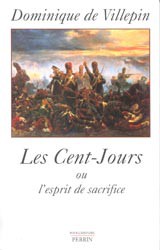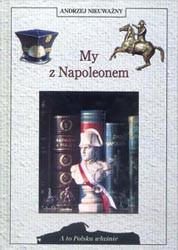History Prizes 2001
 HISTORY GRAND PRIX – FIRST EMPIRE PRIZE
HISTORY GRAND PRIX – FIRST EMPIRE PRIZE
Dominique DE VILLEPIN, Les Cent-Jours ou l’esprit de sacrifice, Paris, Perrin
Between 1 March, 1815, the date when Napoleon landed at Golfe-Juan, and 8 July, when king Louis XVIII returned to the capital after the abdication of the Emperor, there took place a series of events which stupefied both France and Europe. At the heart of the story stood Napoleon back from his exile on Elba where he had dreamt and planned his comeback. But the Napoleon who came back was very different from the one who left, almost unrecognisable: he was a man alone, no longer with his imperial aura, often doubting himself and his destiny, desperate to convince the notables and his allies of the sincerity of his conversion to liberalism and to peace. Facing him, Louis XVIII was the embodiment of a philosophy, a memory, and a legitimacy completely opposed to those of Napoleon. Their confrontation rekindled the flames of the Revolution/Counter-Revolution conflict, and a new fissure opened up between those in power and society, the people and the notables.
And the history turned to epic with the march on Paris (the city taken without a shot being fired), the difficult birth of a liberal empire, the titanic struggle in Belgium culminating in Waterloo, the intrigues of Fouché and Talleyrand, ‘vice and crime’, in the taking of power, and the departure into exile.
The Hundred Days were both a ‘Greek’ tragedy and the crucible of modern France. They had the inexorable development of the former and the marvellous effervescence of the latter, boundless ingenuity which overturned the old order.
Born in 1953, Dominique de Villepin has been Secrétaire général of the Présidence de la République Française since 1995. A lover of history in general and Napoleonic history in particular, he has also published several collections of poetry: Parole d’exil (1986), Le droit d’aînesse (1988), Sécession (1996) and Elégies barbares (1996).
 SECOND EMPIRE PRIZE
SECOND EMPIRE PRIZE
Jean DES CARS, Eugénie, la dernière impératrice, Paris, Perrin
Basing his work on correspondence and family memorabilia, Jean des Cars has brought to light many previously unknown interesting details concerning the wife of Napoleon III. In his opinion, Eugénie has been “maligned and forgotten; but the fact is, in the face of trials which tested her to the limit, she always showed great courage”. This biography is the result of four years of research, including visits to Spain, Germany, Britain and France. It gives a fuller picture of an empress towards whom the official historiography has often been unjust. Eugénie deserves to be better known and as a result better appreciated. This biography is soon to be translated into Spanish.
Born in Paris in 1943, Jean des Cars has published many landmark books, notably Louis II de Bavière, Sissi, Malesherbes, Gentilhomme des Lumières (which was awarded the Grand Prix de la Bibliographie d’Histoire de l’Académie Française). Fascinated by the Second Empire, he has written biographies of Haussmann (Haussmann, published by Perrin), and the Princess Matihlde (La Princesse Mathilde, the standard work on the emperor’s cousin, which won the Prix Napoléon III).
 HISTORY PRIZE FOR NON-FRENCH BOOKS
HISTORY PRIZE FOR NON-FRENCH BOOKS
Andrzej NIEUWAZNY, My z Napoleonem, Wydawnictwo Dolnoslaskie
The title of the work is an inverted paraphrase of a quotation from the poem Pan Tadeusz by Adam Mickiewicz: God is with Napoleon, Napoleon with us. Few French people know that the song of the soldiers who fought with Napoleon in the First Italian Campaign, La Mazurka de Dabrowski, is part of Polish official culture in that it became the Polish national anthem in 1926.
The aim of this book therefore is to present the Napoleonic heritage, both reality and legend, in Polish history. It is also an attempt to show the ‘Polish’ Napoleonic legend. The author recounts the Napoleonic highlights, notably the creation of the Duchy of Warsaw, seen as an attempt to recreate Poland, and then goes on to trace the varied fortunes of the ‘Polish’ Napoleonic legend up to the present day. He notes that the remembrance of the Napoleonic wars greatly contributed to the Polish struggle at the beginning of the 20th century, strengthening the spirit of the youth of Poland after 1918 and acting as a foil during the Communist regime.
Before becoming a lecturer at the Copernicus University,Torun, Andrzej Nieuwazny taught in France (Université of Nancy II). He is held to be one of the best Polish specialists on Napoleonic history and writes for many historical reviews.
 PRIZE FOR AN AUDIO-VISUAL WORK
PRIZE FOR AN AUDIO-VISUAL WORK
David GRUBIN, Napoléon, Studio Canal
How is it that Napoleon rose and then fell so quickly, to end up dying alone and desperate on Saint Helena? This is the story told with brio in the series by David Grubin. In two 75-minute episodes, Grubin helps us to discover and understand all Napoleon’s contradictions, outbursts and excesses.
In order to tell such a packed story and to give it its epic and emotional dimension, David Grubin filmed an intelligent combination of sounds and images. He shot scenes in some of the most Napoleonic parts of the world, from the volcanic island of Saint Helena (lost in the middle of the South Atlantica), via the island of Corsica, where Napoleon was born and spent his early childhood, to Fontainebleau, Paris, Waterloo, Austerlitz, Lodi, Milan, Egypt and Elba. To make this documentary, Grubin interviewed some of the best historians of this period, namely Jean Tulard, Jacques Jourquin, Jacques Garnier, Jean-Paul Bertaud, etc.
Producer, writer, and film director, David Grubin has won some of the most prestigious awards in his industry (e.g., 8 Emmys, a George Foster Peabody prize, and the Alfred I prize). He has produced more than 60 films, all on different themes, passing from history of art to poetry and the scientific world.
